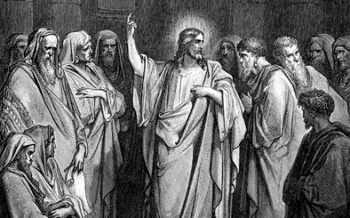
I heard, recently, of a church action that made me angry. A young minister in an effort to evangelize the young people in his church, invited a team of youth evangelists to spend time with his teenagers and help lead them to Christ. His superiors, rather than encouraging him in his work, gave him permission—but with much reservation. They put such restrictions on the project that it all but quenched the enthusiasm of the ambitious minister. How could an organization that is commissioned to bring Jesus Christ to the world use its authority to block those who are being true to its mission?
Is this something new that is going on in the Church today? Sadly this kind of hypocrisy dates all the way back to Jesus and the prophets who preceded him. Today’s gospel selection is a lengthy expression of Jesus’ anger (Luke 11:47-54).
“Woe to you who build memorials of the prophets whom your fathers killed. Consequently, you bear witness and give consent to the deeds of your ancestors, for they killed them and you do the building.”
Ouch!
Had these religious leaders lived in the days of Jeremiah, they would have led the charge in ridiculing him and stoning him. Now that he was dead and his work was part of history, the leaders saw profit involved in erecting memorials in his honor. Now they could honor him, since he was no longer a threat to them. All the while they were collecting money for the “Jeremiah shrine,” they were doing all they could to turn the people against the new “Jeremiah” in their midst. Out of one side of their mouths they were pretending to honor Jeremiah, and out of the other side they were arranging to kill him.
Jesus’ anger had not yet been spent.
“Therefore, the wisdom of God said, ‘I will send to them prophets and Apostles; some of them they will kill and persecute in order that this generation might be charged with the blood of all the prophets shed since the foundation of the world.”
He was telling the leaders of his day that they would be responsible for all the blood shed by God’s prophets since the day of Abel. This is the worst indictment I can imagine being put on anyone.
He then turned to the theologians of the day:
“Woe to you, scholars of the law! You have taken away the key of knowledge. You yourselves did not enter and you stopped those trying to enter.”
It is one thing to refuse to accept Jesus. It is a far worse thing to use one’s authority and learning to keep others from accepting him. Church officials and scholars who try to turn people against the “prophets and Apostles” that God sends today are guilty of the blood that they shed, even if they are not the ones who hammer the nails. How sad when a person uses his or her God-given intelligence to make fun of God’s own messengers. They prefer their own empty knowledge to God’s living truth.
I’m glad I wasn’t there when Jesus spoke with such anger. I would have been shivering in my boots.
Did Jesus’ words have an impact on the guardians of the Law? Yes, but not in a good way. Rather than repent, they “began to act with hostility toward him (Jesus) and to interrogate him about many things.” Like their ancestors, they started their plans to get rid of Jesus just the way their fathers got rid of Jeremiah.
Are we surprised that Jesus would be angry, even today? God, in his mercy, continues to send the Church prophets and Apostles, and the very organization that was formed to support and promote them, tries to shut them down. If we sent our own children to bring a message to the community, and the people made fun of them and even killed some of them, how would be feel?
How does this message affect me today?
What is my response when I feel the righteous anger of Jesus in my heart?
Is there any hypocrisy in me, even though I am not a church leader? Do I find myself being ashamed of Jesus?
When the Holy Spirit upsets me, do I repent or try to defend myself?
“In Christ we have redemption by his Blood, the forgiveness of transgressions, in accord with the riches of his grace that he lavished upon us” (Ephesians 1:7).
